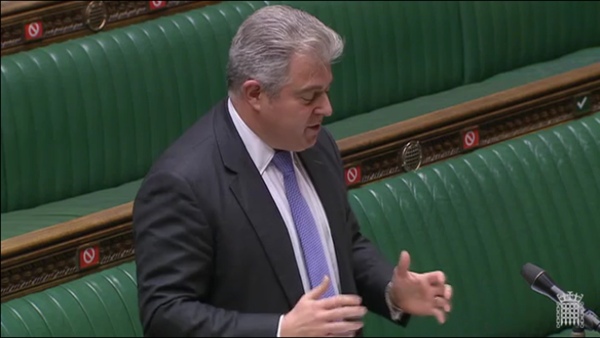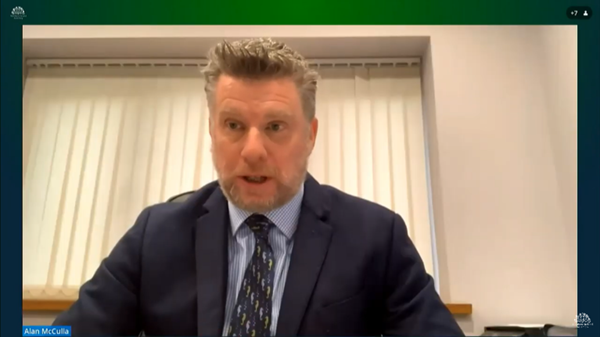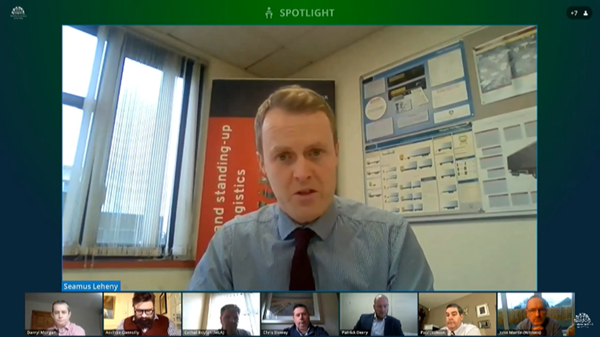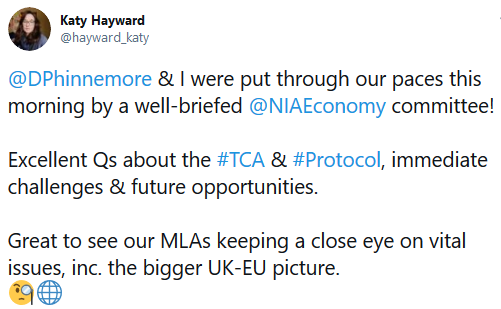Brexit Brief Newsletter
25 January 2021

Last week Northern Ireland Assembly Committees heard from business representatives and academics on the implications for Northern Ireland of the EU-UK Trade and Cooperation Agreement, and the Protocol on Ireland/Northern Ireland. MLAs heard evidence on Brexit’s impact on the fishing sector, haulage and logistics, and supply of goods to Northern Ireland. Meanwhile, in the House of Commons Secretary of State for Northern Ireland Brandon Lewis was questioned on the disruptions to GB-NI trade experienced since the end of the transition period.
Secretary of State Brandon Lewis questioned on GB-NI trade disruption
On Wednesday 20 January, Secretary of State for Northern Ireland Brandon Lewis took questions on Northern Ireland in the House of Commons. DUP MP Jeffrey Donaldson asked about the disruptions to GB-NI trade. Lewis stated that the Government is taking a “pragmatic and proportionate approach in maintaining Northern Ireland’s integral place in the UK internal market”. He stated that the Government will not resist using Article 16* of the Protocol on Ireland/Northern Ireland “if it is appropriate and right to do so”. Lewis argued that “goods continue to flow effectively and in normal volumes” GB-NI and that issues are being addressed in consultation with businesses.

Secretary of State for Northern Ireland Brandon Lewis taking questions in the House of Commons. Source: UK Parliament TV
On Wednesday afternoon, the Secretary of State took questions from the House of Commons Northern Ireland Affairs Committee. Lewis sough to emphasise that there have also been issues resulting from Covid, and that some companies made commercial decisions before the trade deal was concluded, but he acknowledged that there is a new system with associated challenges and learning curves. Lewis contended that the time to assess the Protocol is in a month or two, not in the first few days.
Lewis sought to downplay the notion that the grace periods could be extended, saying he is determined to work with sectors, supermarkets, and the Department of Agriculture, Environment and Rural Affairs to ensure they are ready for the end of the grace periods and to find a long-term permanent solution to ensure products continue to flow smoothly.
Ian Paisley MP said that there is a de facto border GB-NI and that the first days of January have been “an unmitigated disaster” for trade. Lewis pointed out that NI could have a “huge competitive advantage” and said the right way through is to consider how to make the Protocol work in an efficient way which achieves its objective.
Paisley raised the 25% steel tariff facing NI companies and the Secretary of State told him that guidance would be issued soon to deal with this. This was confirmed on Thursday by Manufacturing NI, who stated that HMRC had written to them confirming the issue is resolved. There will be some additional admin work, but NI businesses will be treated the same as GB businesses and won’t be charged a 25% tariff while the UK quota has not been breached. Additionally, steel landed in Ireland will be considered under the EU quota and won’t incur a tariff.

Source: Seamus Leheny on Twitter
The Secretary of State will be further questioned by the Committee this week (Wednesday 27th January, 4.30pm).
* Article 16 of the Protocol on Ireland/Northern Ireland states that if the Protocol leads to “serious economic, societal or environmental difficulties that are liable to persist, or to diversion of trade”, the UK or EU “may unilaterally take appropriate safeguard measures”.
Fishing quotas: “We just want our share”
The Committee for Agriculture, Environment and Rural Affairs heard evidence from the Northern Ireland Fishermen's Federation on Tuesday 19 January 2021. Alan McCulla from the Anglo North Irish Fish Producers Organisation said that the industry’sgreatest fear is that the UK Government will seek to redistribute the additional quota (gained as a result of the UK leaving the EU) away from NI. Currently Northern Ireland has 8.4% of the UK’s fishing opportunities.
McCulla told MLAs that NI fishermen fear they may lose out with new allocations, saying, “That’s the level we have got to, having replaced one EU system of discrimination to Northern Ireland fishermen, that we’re now going to replace it with a GB system that applies more discrimination.”

Alan McCulla of Anglo North Irish Fish Producers Organisation speaking to the Committee. Source: NI Assembly
McCulla emphasised that, “we just want our share” and that they are willing to discuss how this might be further managed within NI. If NI’s current share is applied to the additional quota gained as a result of Brexit, “it should mean that Northern Ireland gains new fishing opportunities in all sea areas worth £19.1 million per annum from 2026.” Clare Bailey MLA pointed out that the UK Fisheries Act guarantees equal access to all UK fishing boats to British fishery areas.
McCulla noted that designated fishing ports is a ‘live issue’ in relation to the Protocol. He welcomed the step by the Irish Government to designate five additional ports for NI-registered vessels, but argued that some of the regulations in the Protocol are “simply daft” when it comes to the fishing industry.
Meanwhile, the UK Government has announced £23 million financial support for UK fishing businesses which export to the EU. GB seafood exports to the EU must now have customs declarations, Catch Certificates and Export Health Certificates (EHCs). This came after fishing lorries travelled to Westminster to protest the ‘red tape’ which has been delaying their exports to the EU.
Committee for Infrastructure: Trade and logistics challenges
On Wednesday 20 January the Committee for Infrastructure heard from the Northern Ireland Retail Consortium, Logistics UK and the Road Haulage Association on the issues facing their sectors. Paul Jackson of McBurney Transport told the Committee, “it has been the worst ever period in my life in preparation for Brexit”. Seamus Leheny of Logistics UK said the situation was “not sustainable”.

Seamus Leheny of Logistics UK Source: NI Assembly
The lack of preparation among companies in Great Britain for sending goods to NI, means that companies have had to bring back empty lorries to Northern Ireland at their own expense. AodhánConnolly of the NI Retail Consortium said the issues about supermarket supplies “have to be kept in context” and pointed out that a “good supply of products” is reaching NI’s shelves. He said it was “a bit reckless” to suggest the supply chain was on the brink of collapse.
Leheny called for a further grace period on the checks, while Jackson stated that “Northern Ireland’s going to get worse in April if we don’t get some easement”. The hauliers emphasised the financial impact which the new requirements and delays have caused, and outlined their concern that this could force some companies out of business. The Committee intends to write to the Department regarding financial support for the haulage industry, as called for by Patrick Derry of Derry Refrigerated Transport.
Academics on the implications of the TCA and Protocol
Professors Katy Hayward and David Phinnemore of Queen’s University Belfast spoke to the Committee for Economy on the implementation of the EU-UK Trade and Cooperation Agreement and the Protocol on Ireland/Northern Ireland. Phinnemore noted that decisions taken by the Withdrawal Agreement Joint Committee in December made some changes to the annexes of the Protocol (which lists the EU legislation which applies to Northern Ireland): the protocol is dynamic and there is work to be done so NI is aware of what is coming and has a voice in the available processes, for example, in the Joint and Specialised Committees and Joint Consultative Working Group.
Hayward pointed out the “reality of hugely significant change” which will take time to adjust to. Phinnemore expressed concerns about the UK Government’s willingness to acknowledge the level of disruption that the end of the transition period would bring: “if you’re coming out of the [EU] single market, if you’re coming out of the customs union, then this is going see the introduction of the increased formalities, checks, and controls, and that is going to lead to disruption.”
Hayward said NI’s position in relation to the UK’s and EU’s Free Trade Agreements (FTAs) is something which hasn’t yet been resolved. The EU will consider this on case by case basis, but there would be potential benefits for NI. NI should benefit from the UK’s FTAs, but because of the Protocol there are particular implications for Northern Ireland, and the reality is more complex, for example, if a UK FTA allows goods into GB which are not allowed into the EU.

Source: Katy Hayward on Twitter
Other news
- The House of Commons Committee on the Future Relationship with the EU (which ceased to exist on 16 January) has published its final report, ‘The shape of future parliamentary scrutiny of UK-EU relations’. The report considers why parliamentary scrutiny of UK-EU relations should continue beyond 2020, and how that can be achieved.
- Mixed food loads, known as ‘groupage’, have been causing problems for traders and hauliers. The UK Government has stated it is working on practical mitigations with industry, and will issue guidance in the coming days. On Wednesday, Logistics UK said a first trial run of the new system to deal with this issue was successful.
- The Committee for Agriculture, Environment and Rural Affairs heard an update from the department on Common Frameworks. Common Frameworks are being developed in policy areas which were previously governed by EU law and which intersect with devolved competence.
- 144 Members of the European Parliament have written to European Commission President Ursula von der Leyen asking her to consider how Scotland and Wales could continue to participate in the Erasmus Programme.
- Ireland is set to receive €1.05 billion from the EU’s Brexit Adjustment Reserve set up to help counter adverse economic and social consequences in Member States and sectors worst affected by Brexit.
- Invest NI CEO Kevin Holland told the BBC World Business Report that now Northern Ireland is a very attractive proposition for potential investors around the world - companies in NI can have open access to two of the biggest global markets (the UK and the EU) from one location.
- The EU’s Ambassador to the UK, João Vale de Almeida, has not been given the same status as other ambassadors to the UK. The UK Foreign Office has sought to treat the EU’s representation in London as that of an international organisation, which would not be granted the same privileges and immunity. The 142 other countries around the world where the EU has a delegation grant them a status equivalent to that of countries. A Foreign Office statement has said that “the EU, its delegation and staff will receive the privileges and immunities necessary to enable them to carry out their work in the U.K. effectively.”
- The EU is reorganising its management of its relationship with the UK. The EU’s Task Force for relations with the UK will disband from 1 March 2021. A new Service for the EU-UK Agreements (UKS) is being established. Michel Barnier will become a Special Adviser to President Von der Leyen. Maros Šefčovič has been appointed co-chair of the UK-EU Partnership Council, which was established by the UK-EU Trade and Cooperation Agreement to ensure the Agreement is properly applied and interpreted and as a forum for discussing issues.
- The UK has appointed a new Head of the UK Mission to the EU, Lindsay Croisdale-Appleby. He takes over from Sir Tim Barrow.
- Amazon has informed its marketplace sellers that GB-NI parcels will require a customs declaration following the end of the grace period at the end of March. This could mean increased delivery fees for customers in Northern Ireland.
- There have been reports of the difficulties experienced in light of the new regime whereby Northern Ireland continues to apply EU rules on plants, while the rest of the UK does not. Plants now require a plant health certificate to enter into Northern Ireland, while some products are prohibited entirely, such as soil.
- The House of Commons Environment, Food and Rural Affairs Committee has launched an inquiry on moving animals across borders, including animal exports, domestic pets, pet smuggling and equines. Neil Parish MP, Chair of the Committee said “We want to ensure that the Government is taking the right actions to ensure the best possible animal health and welfare, alongside supporting business and pet owners." You can submit your view to the Committee. The Committee is seeking answers on the impact of the new UK-EU agreement on moving animals across the Irish border and between GB and the EU/Northern Ireland, among other areas.
This Week at the Assembly
- Wednesday 27 January, 10am - Committee for Economy - Departmental Briefing - EU Exit Update
- Wednesday 27 January, 10am - Committee for Infrastructure - Departmental Briefing – Brexit
- Wednesday 27 January, 2pm - Committee for the Executive Office - Oral evidence session with Junior Ministers on Brexit issues
- Wednesday 27 January, 2pm - Committee for Finance - Public Procurement Common Framework - Oral Evidence from the Department of Finance
- Thursday 28 January, 10am - Committee for Agriculture, Environment and Rural Affairs - EU Exit legislation
- Thursday 28 January, 2PM - Committee for Justice - Consideration of EU Exit legislation
Catch up with the Committees
- Monday 18 January, 12pm – Plenary - NSMC Plenary and Institutional Meetings - Ministerial statement; Question Time - Agriculture, Environment and Rural Affairs
- Tuesday 19 January, 1pm - Committee for Agriculture, Environment and Rural Affairs - Evidence from Northern Ireland Fishermen's Federation on impact of EU Exit
- Wednesday 20 January, 11.15am- Committee for Infrastructure - Brexit - Issues facing the freight/haulage sector: Briefing from Northern Ireland Retail Consortium, Logistics UK and Road Haulage Association
- Wednesday 20 January, 10am - Committee for Economy - Update on EU Exit from Katy Hayward & David Phinnemore
- Wednesday 20 January, 2pm - Committee for Finance - Oral Briefing from Solace NI and NILGA on EU Successor Funding in Northern Ireland
- Thursday 21 January, 10am - Committee for Agriculture, Environment and Rural Affairs - Briefings on Common Frameworks and EU Exit regulations



